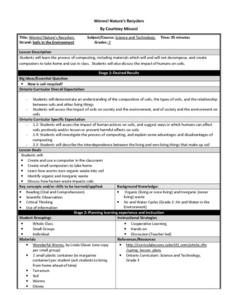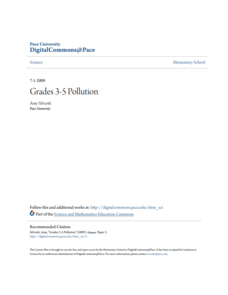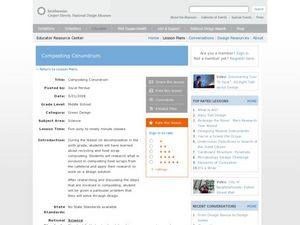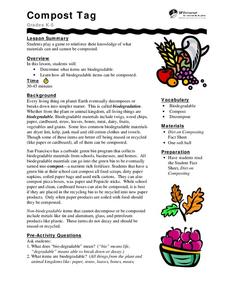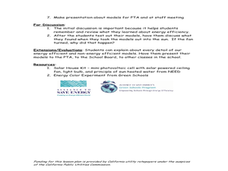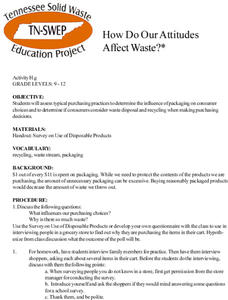Curated OER
Trash Disposal Choices
Students determine the differences between reusable, compostable and recyclable trash.
Curated OER
Dumptown, USA: Making a Ton of Difference
Students investigate the recycling system in the United States by participating in an online activity. In this environmental care lesson, students research what makes up our trash output in this country and where it goes. Students...
Curated OER
Dirty Decomposers
Students explore the ecosystem by conducting a ziploc bag experiment. In this recycling instructional activity, students identify decomposer organisms in our environment and how they speed up the recycling process. Students utilize a...
Curated OER
Worms, Nature's Recyclers!
Students study what worms need to survive in different environments. They study how worm composting improves soil and reduce waste. They discuss composting techniques and present a puppet show about a worm's life.
Curated OER
Separation Before Plastic Recycling
Students participate in a demonstration to test the different densities of plastics, and suggest a method that plastic waste can be separated and collected.
Curated OER
Recycling and Waste Management Debate
Students research issues about how a community should manage its garbage. Students present and debate solid waste management strategies by presenting multiple sides of the issue.
Curated OER
Recycling!
The students recall events from Dr. Seuss' story The Lorax and make connections to environmental issues affecting their lives. They are expected to reflect on the facts of the story and respond verbally stating the inferences they made...
Minnesota Department of Natural Resoures
Tree Life
The life of a tree is the focus of a packet consisting of several activities all covering a different subject. Second graders measure shadows, make pinecone critters, write poems, count rings, complete a word search, play tree tag, and...
Pace University
Pollution
Over the course of 10 days, scholars take a pre-assessment to place them in one of three leveled groups. Whole-class and in small groups, pupils take part in read-alouds, field trips, hands-on activities, and complete learning contracts...
Pace University
Grade 7 Earth Day Statistics with Circle and Bar Graphs
Take a tiered approach to studying waste. The activity uses Earth Day to present differentiated instruction around using circle and bar graphs. Each group gets a cube based on their tiers and works collaboratively as well as individually...
Curated OER
Mini-Sanitary Landfill
Second graders work in groups to bury a variety of trash items and arrange them in a mini-landfill. They predict which items will biodegrade and then keep records of what the items look like every ten days. Students consider how...
Curated OER
Dumptown Game
Students engage in an interactive play scenario. They are the new managers of a fictional city and live in a place where nothing is recycled. Students are faced with various problems that need to be solved. They work together to propose...
Curated OER
Toxic Transmission
Students read article, "Toxic Transmission" and discuss technology pollution, specifically cell phone pollution and its ripple effects in other parts of the world.
Curated OER
After the Garbage Can: Where Does Our Trash Go?
Students explore how waste disposal has changed over time and what the current issues are. In this disposal lesson students collect data and create graphs.
Curated OER
Composting Conundrum
Students research cafeteria composting. In this composting lesson, students design a vessel that would allow the cafeteria staff to collect food scraps for composting. Then students build a prototype and present it to the class. Lastly...
Curated OER
The War Lesson Plan
High schoolers view video clips of the film "The War". Several classroom activities are included and address major themes found in the film. The lessons incorporate video clips from the film as well as additional resources provided.
Curated OER
Fancy Packaging
Youngsters consider the amount of packaging used in manufacturing food and follow its travels through to the landfill. They brainstorm ways in which to reduce packaging and take a survey at home to evaluate ways they could reduce trash.
Curated OER
Recycled Water?
Students participate in a hands-on activity to investigate how water is recycled in a small environment, and determine how water is cycled on earth.
Curated OER
How Much Are We Using?
Third graders investigate environmental stability through consumption and recycling. They look into how much of a recyclable good it takes to create one new product. Pupils compile a list of these quantities, then create posters that are...
SF Environment
Compost Tag
Composting is a great way to get children involved in recycling. First, they discuss how biodegradable products decompose to make compost. Then, they talk about what can and cannot be composted. They play a game similar to around the...
Curated OER
Trash Talkin
Students investigate recycling at several scales, including local, state, national and global. They become aware of recycling, re-use, reduce efforts and policies. Students read the article Where Does Your Garbage Go. They look up where...
Curated OER
Crafting Models of Efficiency
Young scholars build and compare models of both an energy inefficient and efficient classroom. In this energy efficiency lesson, students creatively use recycled materials to build two separate classroom models. They factor in concepts...
Curated OER
How Do Our Attitudes Affect Waste?
Young scholars conduct a survey of society's typical purchasing practices to determine the influence of packaging on consumer choices and to determine if consumers consider waste disposal and recycling when making purchasing decisions.
Curated OER
What Is Special About Polyethylene Food Storage Bags?
Students participate in an investigation in which they compare a polyethylene bag designed for recycling or disposal with a polyethylene food storage bag. Students use hexane to determine the differences between the low density...





